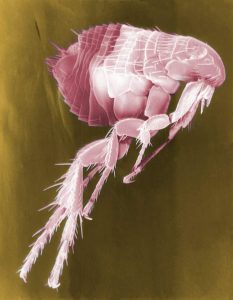#NuisanceNovember: Fleas
Feeding off the blood of humans and pets, fleas can leave you with an uncomfortable rash as a result of their bites.
Luckily, these insects prefer to feed on hairy animals such as dogs, cats, rabbits, squirrels, rats, mice, and other domesticated or wild animals, but if they nest in your home, fleas can become a real pest problem.
Fleas do not have wings, but instead, have long muscular legs which allow them to jump very long distances. Female fleas can live for up to two years, during which time they can lay up to 1000 eggs. They will lay their eggs after feeding on the infested animal, and will leave them to drop onto the floor and animal’s bedding. After several days the eggs will develop into larvae. When fully developed the adult waits within this until it detects the vibrations caused by a potential host, and then it will emerge.
This cycle will only take about a month to complete.
Eggs will hatch on the ground, in rugs, carpet, bedding, upholstery or even in cracks in the floor. Most hatch within two days, meaning if a flea infestation does take hold, it can spread quickly.
You can follow these simple steps to help prevent an infestation:
- Vacuum your property regularly
- Wash pet bedding weekly
- Check your pet regularly using a flea comb
- Try and remove any potential food supply to prevent fleas from feeding on organic matter in carpets, bedding & furnishings
- When moving into a new home inspect carpets and flooring carefully for signs of eggs or ‘flea dirt’. If the previous owners had pets, the flea larvae might be waiting for you.
Trying to get rid of fleas by yourself may not result in a full extermination of the pests, and you may find some are left behind. They can then reproduce, and your pest problem will come back. When treating a flea infestation, we thoroughly treat every room in the property, as they may have been passively transported from one room to another by yourselves or pets.
If you suspect you have a flea problem, contact us today. Our fast and friendly call out service will help you as best we can. You can also get involved in our #NuisanceNovember hashtag, send us a tweet with any questions you might have about pest control.
